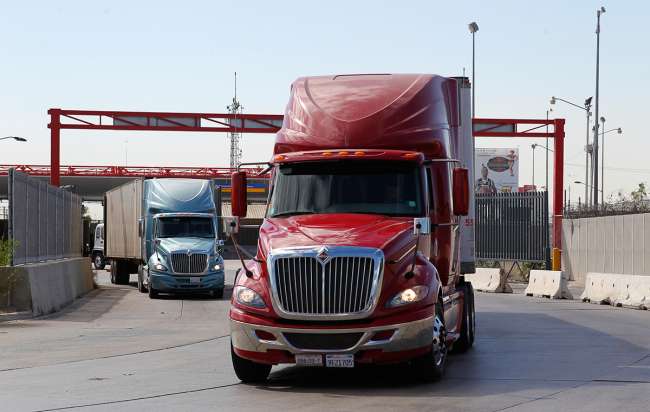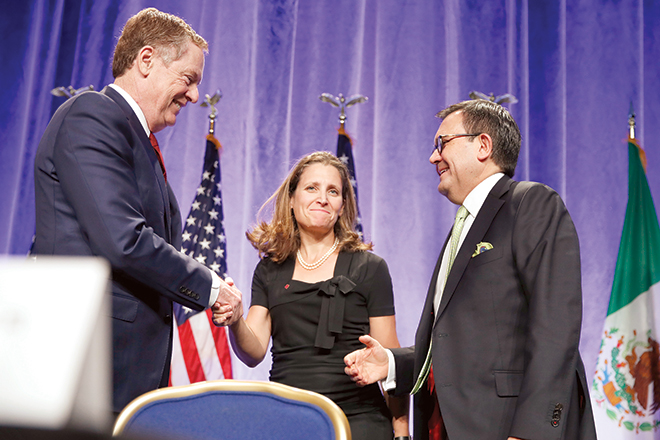Freight Shippers Express Support for NAFTA's Trucking Provision

A broad-based coalition of freight shippers is pushing back against a U.S. proposal that would place more restrictions on Mexican trucking companies as part of a renegotiated North American Free Trade Agreement.
The issue of Mexican truck access is expected to be taken up by representatives of the United States, Canada and Mexico when they meet in Mexico City on Nov. 17 for the fifth round of talks aimed at hammering out new terms for the 23 year-old trade pact.
In a Nov. 14 letter to U.S. Trade Representative Robert Lighthizer, representatives of the National Retail Federation and 100 other trade organizations representing manufacturers, farmers and food shippers, wholesalers distributors and importers and transportation and logistics firms urged Lighthizer not to eliminate NAFTA trucking provisions in a new agreement.

Lighthizer (left) shakes hands with his counterparts from Canada and Mexico. (Jacquelyn Martin/Associated Press)
American trade representatives reportedly have proposed removing Mexico’s longhaul truckers from a NAFTA chapter on cross-border services, a move that could make it harder for Mexican fleets to expand their operations in the United States, according to Bloomberg News.
President Donald Trump has threatened to withdraw from NAFTA unless the United States can get a deal that brings more factory jobs back to the United States and gives U.S. companies better access to foreign markets.
In a statement following the president’s speech on trade at the Asia Pacific Economic Cooperation CEO summit in Vietnam on Nov. 10, Lighthizer struck a defiant tone.
“The era of trade compromised by massive state intervention, subsidies, closed markets and mercantilism is ending,” he said. “President Trump understands that too many nations talk about free trade abroad, only to shield their economies behind tariff and non-tariff barriers at home. The United States will no longer allow these actions to continue and we are willing to use our economic leverage to pursue truly fair and balanced trade.”
Jonathan Gold, vice president of supply chain and customs policy for the National Retail Federation in Washington, said while the group has not seen the precise language in the proposal on Mexican trucking, just the prospect of losing NAFTA’s trucking provisions is worrisome because it would exacerbate capacity constraints and a shortage of drivers in the United States.
“We hope to see expansion [of Mexican trucks operating in the U.S.],” Gold said in an interview with Transport Topics. “As long as Mexican fleets are qualified, we see no reason why the [cross-border] trucking program could not be expanded.”

Lighthizer struck a defiant tone Nov. 10 on revising NAFTA. (Jacquelyn Martin/Associated Press)
Trucks haul more than 80% of goods across the Mexican border and more than 70% of the goods across the Canadian border, according to American Trucking Associations, and Mexican and Canadian truckers are not permitted to carry domestic freight in the United States.
Only a handful of Mexican trucking companies have received clearance to operate beyond border zones, and most U.S. trucking companies use local carriers to handle freight shipments south of the border.
Rather than restrict Mexican truckers in the United States, ATA officials said negotiators should push for changes in customs regulations to permit commingling of freight in trailers heading into Mexico from the United States and allowing drivers to reposition empty trailers within the United States.
In a joint statement issued last month, representatives of ATA, the Canadian Trucking Alliance and Mexico’s Camara Nacional del Autotransporte de Carga urged NAFTA negotiators to update the 23-year-old trade agreement “in a manner that continues to benefit trade.”
“Cross-border trade supports over 46,000 U.S. trucking jobs, including 31,000 U.S. truck drivers, and generates $6.5 billion in revenue for our industry annually,” said Bob Costello, ATA’s chief economist.
In the NRF letter to Lighthizer, the industry trade groups underscored the fact that Mexican carriers and drivers are not competing with U.S. carriers and drivers.
“Currently, it is a small, but important way of making sure our industries and North America remain competitive in the world market,” the letter stated.
Among the letter’s signatories are the American Farm Bureau Federation, American Apparel & Footwear Association, American Frozen Food Institute, American Home Furnishings Alliance, Motor & Equipment Manufacturers Association, National Electrical Manufacturers Association, The Fertilizer Institute and the Wine & Spirits Wholesalers of America.

